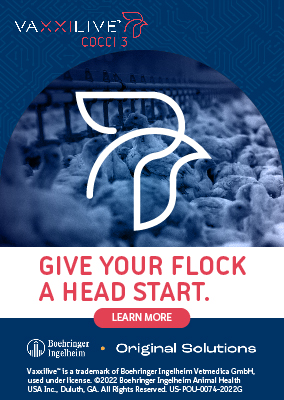 The message is clear and one that Daral Jackwood, PhD, has delivered for years. Young chickens need maternal immunity to protect them from immunosuppression and secondary diseases caused by infectious bursal disease (IBD).
The message is clear and one that Daral Jackwood, PhD, has delivered for years. Young chickens need maternal immunity to protect them from immunosuppression and secondary diseases caused by infectious bursal disease (IBD).
“Proper breeder vaccination is really the heart and soul of protecting against this disease,” says Jackwood, professor emeritus at The Ohio State University.
“If you get the maternal immunity right and vaccinate their progeny early for IBDV, when you do get a bursal disease virus infection, the birds are going to be better prepared to handle the challenge and less likely to succumb to secondary infections. This is also true for other immunosuppressive viruses like chicken anemia virus (CAV). Simply stated, they’re going to recover, and that’s the key.”
Immunosuppressive issues in chickens related to IBD have troubled the poultry industry for decades. Jackwood, who specializes in food-animal research, has helped producers find solutions to IBD.
In a recent interview, Jackwood discussed IBD and vaccines for protecting poultry operations against IBD’s immune suppression and secondary diseases:
Q: Why is maternal immunity important when we have vaccines for IBD?
DJ: Maternal immunity is imperative for early progeny protection from an IBDV field challenge. It takes time for the immunity to develop when chicks are vaccinated for IBD. They need protection at day 1 because these birds may be exposed to field viruses as soon as they are placed in the house. Maternal immunity provides that protection.
If you have a breeder flock that’s poorly vaccinated, their progeny will have low maternal antibodies. Those antibodies are going to drop off very quickly, and the progeny chicks will become infected when the bursa is most susceptible.
High IBD maternal antibodies (MAB) are going to last longer, the birds will be older when they become susceptible to IBD infection, and their bursas will be less vulnerable when challenged. This contrasts with the flock that has poor maternal immunity. It’s important because the host cell for IBD virus (IBDV) is an immature B cell located in the bursa early in the bird’s development.
Q: Isn’t that why broiler chickens are routinely vaccinated for IBD?
DJ: Today, the typical IBD vaccines used for IBDV protection are recombinant herpesvirus of turkey (HVT) vectors given in ovo. Around 3 weeks of age, some birds may also receive a live attenuated vaccine as a booster.
Also at about 3 weeks, the bird’s maternal immunity is bottoming out, while at the same time coccidia peak cycling is occurring, disrupting intestinal health. This is the window of susceptibility when the flock can get infected with the IBD virus. The idea is to reduce the window of susceptibility — that is, the time between when the maternal antibodies decline and active immunity starts.
Proper vectored vaccine administration in ovo or day 1, while chicks have high MAB, reduces this window of susceptibility. Vaccine dosing plays a role as well. The window widens with partial dosing or poor vaccination processes because the result contributes to uneven chick immunization.
Q: Why aren’t the in ovo vaccines administered at the hatchery providing protection through that 3- to 4-week period?
DJ: There are several reasons why progeny birds may not be getting a solid immunity to the field viruses. The HVT+IBD vectored vaccines provide solid protection somewhere around 25 to 30 days when properly administered.
These commercial vaccines are highly effective vaccines. The problem is usually associated with the breeders getting the maternal antibodies high enough and uniform enough to give the HVT+IBD vector vaccine a proper chance to work in their progeny.
Also, sometimes the maternal antibodies don’t match the progeny challenge IBD virus due to the mismatch of IBDV strains used in the inactivated vaccine products to the IBDV field strains. If the field viruses have mutated, they can replicate and cause problems in progeny with high maternal antibodies because the antibodies don’t match the field exposure virus.
In this situation, when the progeny are vaccinated in ovo with a HVT+IBD vectored vaccine and/or live vaccine, it may appear as though the vaccine didn’t “take.” The real cause may be that the progeny didn’t have the appropriate maternal antibodies to protect them at an early age. Without maternal antibody protection, the progeny become immune suppressed early due to the IBDV field infection, which also prevents the birds from mounting a proper immune response to the vectored vaccine.
When maternal antibodies match the antigenicity of the progeny IBD field challenge and are properly administered, the window of susceptibility becomes smaller and gives these vaccines a chance to work.
Q: So, monitoring vaccine administration must be critical.
DJ: Yes, it’s important to routinely monitor the hatchery vaccine-administration processes. Vaccination machines play a significant role in getting vaccine to the amnion of the developing embryo. If vaccine is observed on the shell, it’s not getting to the amnion and chicks won’t be immunized.
Similarly, if vaccine is not delivered at the label dose, vaccination uniformity can be compromised. This leads to some progeny becoming susceptible to IBDV earlier in life, IBDV circulating in the flock for a longer time, and increasing viral load — i.e., more virus remaining in the house for subsequent flocks. Lack of uniform immunity leads to lack of uniformity in performance. Higher susceptibility to IBDV in young progeny birds means more immune suppression in the flock, which leads to a higher incidence of other so called secondary diseases as well.
Q: With IBD, is the primary concern that it will suppress immunity and bring on other diseases or does IBD itself bring down the performance of the flock?
DJ: It depends on which bursal disease virus is infecting the flock. If you have the classic-type viruses, these birds get depressed, and they can die. They develop lesions in the bursa and kidney. The birds just don’t do well. You can definitely see some performance differences.
With the subclinical IBDV strains, really what the virus is doing is affecting the immune system. It’s killing B cells in the bursa. The B-cells in the bursas are rapidly depleted. Clinically you may see a lack of flock uniformity, and a mishmash of secondary infections. This may be particularly impactful to small bird production since chickens are marketed at a young age.
In North America, we’re dealing primarily with the subclinical IBDV strains. In other parts of the world, they are most concerned about the very virulent bursal disease virus that can cause severe depression. Morbidity is 100% and mortality can be as high as 60% to 70% in layer flocks and 30% to 40% in broiler flocks.
Q: How do you know when immune suppression is a problem?
DJ: In the very well-managed flocks, you don’t really see much in the way of secondary infections or issues with immune suppression.
Then there are flocks that are not so well-managed, and it doesn’t take much to see immune suppression. You’ll see gangrenous dermatitis, airsacculitis, E. coli, Enterococcus, etc. Basically, anything bacterial in the form of secondary infections.
Q: IBD is caused by a virus, but has the increase in no-antibiotics-ever production had any impact on its prevalence or severity?
DJ: IBD has been around a long time, but yes, it’s causing more problems now. In the past, without vaccines, birds succumbed to IBD but then they were treated with antibiotics for the secondary infections that resulted due to the immunosuppression. Now, we aren’t using antibiotics to treat the secondary infections. If we don’t get birds properly vaccinated for IBD or protected with maternal antibodies, the resulting immunosuppression in chicks definitely impacts performance.
In a poorly managed flock, that immune suppression shows up very quickly.
Q: Earlier you mentioned the importance of vaccinating breeders for IBD and other diseases, so they pass on maternal antibodies to their progeny. Yet, we’re still seeing disease challenges in young chicks. Why?
DJ: We use vaccines in breeder flocks to protect the hens, but mostly to produce antibodies which get transferred through the yolk to the chicks.
Because of this, hatchery and flock management are vitally important. Reducing environmental stressors that contribute to transient immunosuppression — e.g., temperature, humidity, sanitation, chick/pullet handling, etc. — ensures chicks have the best opportunity to develop a healthy immune system. Auditing these processes is a necessary step to raising healthy flocks. Stress impacts yolk absorption, vaccine take and the bird’s normal development.
If best practices are affirmed, it is likely the chicks will have the antibodies that should protect them against bursal disease. But if chicks are demonstrating signs of IBDV or immune suppression before 3 weeks of age, the antigenicity of the field virus may be different than the chick’s maternal immunity.
Q: What do you recommend when vaccinating breeder flocks?
DJ: Vaccinating breeder flocks with the right vaccine is just as important as vaccinating them with any vaccine. Strong antibody titers in your breeder flocks doesn’t necessarily mean you’re going to protect their progeny. That’s where autogenous vaccines come into play. They help to better match the maternal antibodies to the IBDV strains infecting the progeny in the field.
But if you’re a big company and sending chicks to Georgia, Delmarva, Arkansas or Texas, those breeder flocks might need to be vaccinated against a variety of bursal disease virus strains because the antigenic strain causing problems may be different in different regions.
If you can manage your flock so breeder flocks are only producing chicks that are going to one region, it is easier to manage the breeder flock vaccinations.
I think producers may lose sight of that, too. They think we have autogenous vaccines in our breeder flocks, but we still have problems in Texas. Why is that? It may be because the virus that’s causing the problem in Texas is different from the one that the hens were vaccinated against in Georgia.
Q: For breeders and their progeny, what can companies do to get ahead of immunosuppression through vaccination?
DJ: Adding in ovo vectored HVT bursal disease vaccines is very helpful for these birds. When in ovo-vaccinated chicks do get infected with the field virus, they recover faster than birds that did not get an in ovo vectored vaccine.
Another option is to give live attenuated vaccines when the maternal antibodies come down at around 3 weeks of age. If the challenge in the field is very strong and the birds are not managed very well, those vaccines can really be helpful and will jumpstart the immunity that’s coming along from the in ovo vectored vaccine. Keep in mind, proper husbandry and always tending to the needs of the bird are critical factors to preventing stress related transient immunosuppression.
Finally, pay attention to your maternal immunity and make sure that it is done right, and then the rest will fall into place for you.
Editor’s note: Content on Modern Poultry’s Industry Insights pages is provided and/or commissioned by our sponsors, who assume full responsibility for its accuracy and compliance.








